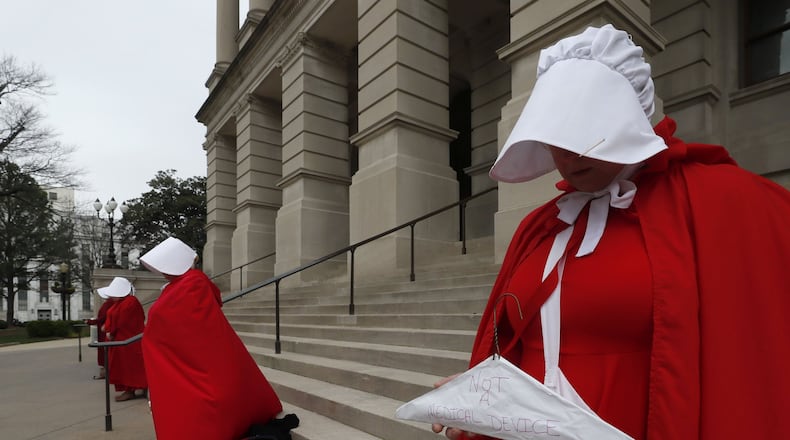Anti-abortion and abortion rights advocates have trained their sights on the Georgia Senate as lawmakers begin to debate what would be one of the country’s strictest abortion laws — a so-called “heartbeat bill.”
The House voted 93-73 late Thursday to approve legislation that would outlaw most abortions once a doctor can detect a heartbeat in the womb.
Now, it is up to the Senate to decide whether it wants Georgia to try to test the U.S. Supreme Court decision Roe v. Wade.
Democrats and abortion rights advocates launched an early attack Friday.
A handful of abortion rights activists showed up at the Capitol, dressed as characters from “The Handmaid’s Tale.” The fictional book and television show are set in a totalitarian society in what used to be part of the United States.
Senate Democrats said not only was the legislation impractical, but it amounted to a “fatal mistake” in an era when female voters — especially in the Atlanta suburbs — are showing up to the polls in droves.
"We saw the way that women voted the last year in that election," Atlanta Democratic state Sen. Nan Orrock said. "That pattern will broaden in the wake of this type of decision making."
» Live: Use AJC tracker to follow Georgia bills
» Photos: Crossover Day at the Georgia Legislature
State Sen. Bill Heath, R-Bremen, took issue with Orrock's comments in a tearful speech.
“People come down here and talk about making fatal mistakes,” Heath said.
Referring to the number of abortions that take place each year in the country, Heath said: “We’ve made too many fatal mistakes.”
About 20 lawsuits surrounding abortion — including several heartbeat laws — are up for consideration by the U.S. Supreme Court, challenging the 1972 ruling that established a nationwide right to abortion. But anti-abortion advocates say they hope Georgia’s bill would be the one to overturn the landmark decision.
“We think we have a better chance than most states, because of our state and circuit court make-ups, to have favorable rulings as the case goes up the chain,” said Joshua Edmonds, the executive director of the anti-abortion Georgia Life Alliance.
A heartbeat is usually detected in a woman’s sixth week of pregnancy. Current Georgia law allows abortions up to 20 weeks. Abortion rights advocates have vowed to challenge the legislation in court if it becomes law.
Under the proposal, women still would be able to get later abortions in cases of rape, incest or if the life of the mother is in danger.
The bill also includes provisions that would require fetuses “at any stage of development” to be included in the state’s population count and allow parents to claim fetuses on their taxes as dependents.
Senate leadership assigned House Bill 481 to the Science and Technology Committee, where state Sen. Renee Unterman serves as chairwoman. The Buford Republican is also expected to carry the bill through the chamber.
Unterman touted her record as an anti-abortion lawmaker, saying she’s sponsored or carried all the legislation limiting access to the procedure that’s gone through the Legislature in the past 15 years.
She said she had not yet analyzed the legislation as it was sent from the House, so she couldn’t say how hard it might be to make it through the Senate.
Similar legislation was filed by state Sen. Bruce Thompson, R-White, that had 23 Republican co-sponsors, including Majority Leader Mike Dugan of Carrollton, President Pro Tem Butch Miller of Gainesville and Unterman. That bill, which did not include language involving the population count or taxes, did not get a hearing.
Unterman said she’s not yet set the agenda for the next scheduled Science and Technology Committee meeting, but it was possible HB 481 could be heard as soon as Thursday.
After a day of advocates on both sides of the issue lobbying lawmakers, reaction to the bill’s passage was swift and strong.
Cole Muzio, the president of the anti-abortion Family Policy Alliance of Georgia, lauded the chamber’s “leadership in protecting the unborn.”
“Our hope is that this movement continues to build toward ultimate passage here in Georgia, and that it will echo around the nation toward transforming the culture,” he said.
Planned Parenthood Southeast President and CEO Staci Fox called the legislation a de-facto ban on abortions, since many women do not know they’re pregnant before an embryo reaches six weeks gestational age.
“Our elected officials heard from their constituents — they just didn’t listen,” Fox said. “But we will not forget this. Lawmakers will be held accountable for playing politics with women’s health, and this fight is not over.”
The vote came after an emotional night of speeches from lawmakers, including the bill's sponsor, Acworth Republican state Rep. Ed Setzler, who recounted the story of his birth in 1970 to a single, 20-year-old woman. He said he was thankful that in Georgia, before the Roe v. Wade decision, his birth mother had put him up for adoption.
“Our job as lawmakers is to protect those who cannot protect themselves,” he said.
Setzler, who won re-election in November by about 4.6 percentage points, has already drawn a Democratic challenger. Kyle Rinaudo, who lost the Democratic primary for the same seat last year, announced his intent to run less than 24 hours after the vote.
State Rep. Erica Thomas, an Austell Democrat who is five months pregnant, said she did not believe anyone was more appreciative of life than she.
“In August, I will have the privilege to bring beautiful life to this earth,” she said. “But that decision was my husband and I’s decision to make. And no one in this chamber has the right to make that choice for me and my family.”
Earlier on Thursday Gov. Brian Kemp, who said he planned to make good on his promise to sign the toughest abortion law in the country, publicly pushed House members to move the bill across the hall.
In a press conference shortly after the vote, Kemp hinted the bill would be amended in the Senate.
“This is a huge step, but we have more work to do in the Senate,” he said. “And I look forward to working with them to get where I can sign this legislation.”
After the vote, House Speaker David Ralston of Blue Ridge said he wasn't sure about the bill's chances in the Senate.
“I know they’re saying it’s an easy decision, but apparently it wasn’t easy up until now,” he said. “But the House has acted, so we’ll wait and see what they do.”
What would ‘heartbeat bill’ do?
- Outlaw abortions once a heartbeat is detected in the womb — usually at six weeks — except in cases of rape, incest and if the life of the mother is in jeopardy
- Someone who has become pregnant after an incident of rape or incest would have to file a police report to have the abortion performed
- A fetus would be included in the state's population count
- Parents could claim a fetus as a dependent on their state taxes
Stay on top of what’s happening in Georgia government and politics at ajc.com/news/georgia-government/.
About the Author
Keep Reading
The Latest
Featured



